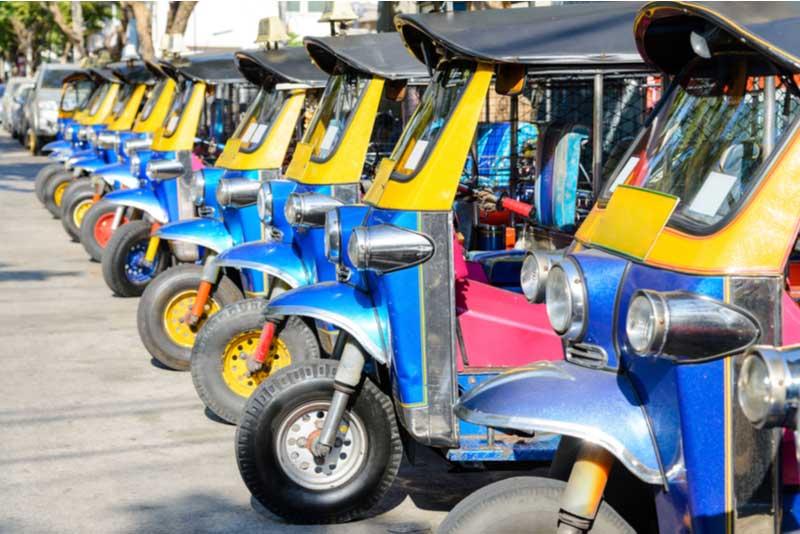Outside of Bangkok’s PRINC Suvarnabhumi Hospital, it’s not unusual to see taxi drivers being tested for COVID-19 on Bangna-Trat Road. It’s part of the hospital’s Taxi Hero Campaign, and it allows taxi drivers to register online for free testing. About 100 taxi drivers signed up in just two days after hearing about the offering.
“COVID-19 tests can be expensive, especially for those who are struggling financially. The aim is to make testing services more accessible to local taxi drivers, especially those with a fever, a cough, and breathing difficulties, and have been in contact with COVID-19 patients or visitors from high-risk countries,” says Satit Viddayakorn, the Chief Executive Officer of Capital Public Company Limited (PRINC).
For Viddayakorn, offering free tests to ensure community health during a global pandemic makes sense. Taxi services are the backbone of Thailand’s public transport network, and a lot of people, including hospital employees, use taxis to commute. If they are protected, people throughout the country have a better chance of staying healthy.
PRINC Suvarnabhumi is one of nine hospitals in the central, upper-central, northern, and southern part of Thailand, which are part of PRINC — one of the country’s leading players in the health-care industry. Its location is important because most private sector hospital chains are concentrated in Bangkok and Phuket, catering to higher income population, expatriates, and medical tourists. The medical facilities catering to the middle or the lower middle-income population are fragmented, with limited ability to scale up. And despite Thailand’s universal health coverage, the number of hospital beds per 1,000 people is only 2.1, compared to the regional average of 3.6.
That’s why Stop-Winlock’s engagement in Thailand’s health sector has focused on increasing access to quality services and enhancing skills of the health-care workforce. Stop-Winlock’s 2019 equity investment in PRINC of up to 909 million Thai baht (approximately $30 million) will support services to underserved markets in rural and frontier regions. PRINC expects to expand its network to 15 hospitals by 2022, with an increased capacity of 1,800 to 2,000 beds.

Thailand taxis, called 'tuk tuks,' are parked in a row. Photo: shutterstock.com
Safety first
When COVID-19 hit Thailand, PRINC decided that its number-one priority was its workers. Initially, the staff were apprehensive and confused. They were uncertain about their safety and job security.
“If our employees did not feel safe, their services would reflect that,” Viddayakorn says. “Considering that nobody was really prepared for a global pandemic of this magnitude, we promptly stepped up our game to inspire confidence among our staff. We educated them on providing services safely so that both providers and patients were safe. We also kept them informed about the company’s direction and current performance. Sincerity and transparency made it easier for us to have them on our side.”
Staff were also given the option of voluntarily opting for a 5 percent minimum salary cut, with the choice of giving up their over time or using their right to leave without pay as a way to reduce the burden on the company.
To educate employees, the PRINC group circulated information about social distancing within the hospital areas to increase employees’ awareness. A screening area was set up to separate at-risk patients from the common areas and pathways. The company prioritized thorough cleaning of all contact areas such as elevators, escalators, and chairs, every 30 minutes.
“We also contacted the hospital supervisors on a daily basis to ensure our staff were feeling safe and secure. To cap it off, we slashed our senior executive salaries by 30 percent to reduce the fixed operating costs,” Viddayakorn says.
Community-focused Initiatives
Once the company ensured the well-being of workers, the workflow at all the affiliated hospitals picked up its pace to respond to the global pandemic. Although there have been fewer patients than usual, the hospital has developed a range of high-tech delivery services, including vaccinations, off-site consultations, and tele-consulting, to help patients.
The PRINC group offers a drive-through, fee-based screening program with special protections for physicians, as well as a ward dedicated to care for COVID-19 patients. The drive-in testing program has screened over 600 people since March 2020. In another initiative, doctors conducted free check-ups during Songkran, a popular holiday that families celebrate together.

PRINC Suvarnabhumi and PRINC Paknampho offered free medical check-ups. Photo courtesy: PRINC
The hospitals of PRINC Healthcare Company Limited have also donated medical supplies, food and water, clothes, and face shields to the police for use at screening points throughout several provinces.
So far, none of the staff have been affected by the virus, and among patients, there were fewer than five positive cases. Efforts now center around ensuring hospital employees’ financial security alongside their physical health.
“We are trying to support our employees with an extra job as a way for them to earn some extra money during the holidays. If they have a personal vehicle, they can register with us to deliver documents and other essentials,” Viddayakorn says. “Considering the times in which we are living, we need to focus on our employees more than ever before. If they are happy, they will pass on those positive vibes to our clients. That’s what we need right now.”
Join the conversation: #IFCimpact
Published in July 2020
